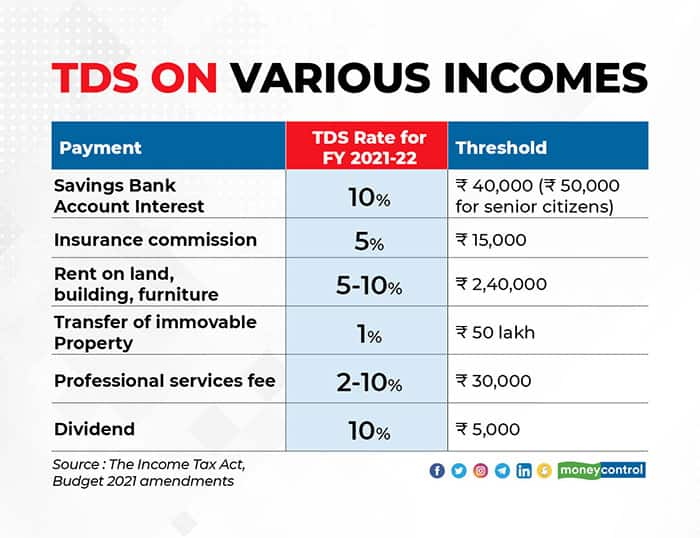 Shortening the window of tax filing status for higher TDS deduction poses issues galore
Shortening the window of tax filing status for higher TDS deduction poses issues galore
Budget 2022 proposed that if you haven’t filed your income-tax returns for a year, you will need to pay a higher TDS (tax deducted at source). Earlier, this window was two years. But there is a catch.
The due date to file your returns for income earned in 2021-22 is coming up in July 2022 (unless it gets pushed back due to COVID-19 related reasons as it has been in the last two years). In simple words, if you have not filed returns for income earned in 2020-21, you will need to file your returns by July 2022 to avoid paying a higher TDS.
What is TDS?
With the financial year coming to an end, if you are making rental payments, selling property or receiving dividend or fixed deposit interest, 1-20% of the amount is deducted as the levy commonly called tax deducted at source (TDS).
To enhance the tax base, non-tax filers were forced to pay double the TDS if returns for the past two years were not filed. Sudhir Kaushik, co-founder, TaxSpanner.com, said, “The move is being planned to increase tax compliance and reduce the number of non-filers. The higher TDS deduction will bring in awareness about tax filing and ensure they are financially punished if they do not file a tax return.”
This rule is applicable to anyone whose aggregate TDS liability is above Rs 50,000 per year and it is not applicable to income from salary. TDS is levied on payments to non-resident Indians and high-value sales, too.
Compulsion to file return by due date
Though the change looks like a halfway mark, it actually means a much shorter period due to the difference between financial year and assessment year (tax-filing year).
“The fine print has linked the provisions to Section 139-1, which means if you do not file the return by the due date, then you would be liable to pay a higher TDS. For instance, if you haven’t filed your tax return for assessment year 2022-23 by July 31, 2022, and one has to pay the rent to you in August 2022, then the tenant would have to deduct double the TDS from you on the rent as you haven’t filed the return for the past year,” said Paras Savla, partner at KBP and Associates, a firm of chartered accountants.
So the interpretation is that you would have to file the return by the due date or pay TDS at double the rate.

Issues faced
However, there are practical issues in implementing this budget provision as every company uses software to keep track of the tax filing status. “With the two-year window introduced last year, we could check the compliance tracker once a year and accordingly decide the TDS percentage, based on the tax-filing status. Now we have to check the status real-time and introduce additional checks and balances. Multiple fields would have to be filled time and again for calculating the TDS liability for each payment,” said Savla.
Tracking the TDS amount is tedious and updating taxation records is difficult and has a time lag. Karan Batra, founder of online tax and financial planning firm CharteredClub, said, “The TDS return is filed at the end of the quarter but the deduction has already been made for instance in April (start of the quarter).”
Many organisations also use a different software and not the income tax department’s compliance tracker directly.
“There are issues in implementation of higher TDS for non-filers as I need to continuously check the compliance tracker. There is a separate software that is used for calculating TDS deduction amount for every quarter. The data updating for the software would have to be robust to include the details based on the compliance tracker,” said Batra.
The documentation too would increase with this shorter timeline. “Last year we introduced a declaration for income tax return filing status for the past two years. Now with the timeline being reduced and updated return option being offered, how many ITR copies do I keep track of,” Batra said.
Claiming refunds for erroneous TDS
If a higher TDS has been erroneously deducted, one can claim a refund while filing the tax return by the normal due date. In fact, if your income is below Rs 5 lakh, you would benefit by filing a tax return. “If you are a small contractor or have little income, it is better to file a return as you would get the deducted TDS as a refund,” suggested Kaushik.
Updated return and refunds
A new feature of update return, proposed in Budget 2022, allows one to file a fresh return too for the past two years. Then you would argue that the higher TDS deducted for non-filing a tax return should be refunded once a return has been filed. However, this wouldn’t be possible. As Savla pointed out, “Updated return can’t result in refund.”
But that doesn’t mean your double rate of TDS is money wasted.
Batra said, “Under updated returns one cannot file a return to get a refund, but based on the date of filing an updated return, the erroneously deducted higher TDS amount can be adjusted against the tax payable.”
So use the feature to your advantage and reclaim your extra TDS.
Source: https://www.moneycontrol.com/news/business/personal-finance/file-income-tax-return-by-due-date-or-pay-double-tds-8182251.html
© 2018 CA Chandan Agarwal. All rights reserved.